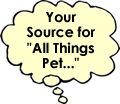Your Hounds Extra Pounds
Share
 Obesity is a common problem in dogs, so if your furry friend is packing on a few too many pounds these days, it is not alone. If your vet agrees with your observation of weight gain, the key is to then identify the possible causes before starting a total weight management program that can result in controlled weight loss and maintenance of an appropriate weight.
Obesity is a common problem in dogs, so if your furry friend is packing on a few too many pounds these days, it is not alone. If your vet agrees with your observation of weight gain, the key is to then identify the possible causes before starting a total weight management program that can result in controlled weight loss and maintenance of an appropriate weight.
Understanding Canine Obesity
From a purely clinical perspective, obesity is defined as an increase in body weight beyond the limitation of skeletal and physical requirements, resulting from an accumulation of excess body fat. It is caused when caloric intake exceeds caloric expenditure. This simply means that your dog eats more energy (calories) than it uses and stores the excess energy, most likely as fat.
There are a few common factors that contribute to canine obesity. Among them are:
- Overfeeding
- Inactivity
- Breed
- Age and gender
- Spay/neuter status
- Diabetes mellitus (When the dog secretes too little insulin hormone from its pancreas or the insulin is not recognized by the body.)
- Hyperadrenocorticism (Also known as Cushing’s disease, this disorder results when too much cortisol — a hormone — is secreted by the dog’s adrenal glands.)
- Hypothyroidism (When the thyroid fails to produce a sufficient amount of hormones that help with metabolism and other bodily functions.)
Nutrient Know-how
Your dog uses fat as its primary energy source. When your dog becomes overweight, it stores fat more easily if the calories are consumed in the form of fat than if they are from carbohydrates. An overweight or obese dog should be fed a low-fat diet to restrict calories available from fat.
A normal fiber level, provided as a moderately fermentable fiber source, helps create and maintain healthy digestion. This is especially important to your dog if it’s on a diet. Some weight-loss foods for dogs dilute calories with high levels of fiber. High-fiber foods may reduce the digestibility and absorption of many nutrients, including fat. These foods reduce weight by providing what could be considered poor-quality nutrition. These high-fiber diets may also result in large, frequent stools and decreased skin and coat condition. Diets that provide essential fatty acids, like those found in vitamin-rich fish oils, help maintain your dog’s healthy skin and coat, despite lowered fat levels.
Take it Slow
The goal of a good weight management program should be gradual weight loss. Your rotund Rover should lose 1% to 2% of its initial weight per week. You can accomplish this by reducing the caloric intake by 30% to 50% of maintenance.
A total weight management program can lead to successful weight loss in your dog. Exercise can help to keep the extra pounds off too. But before beginning any weight loss program with your pet, be sure to discuss the proposed plan with your veterinarian. Your vet may also provide you with additional tips that are tailored to the particular health, age, size and needs of your dog.










